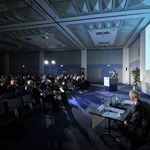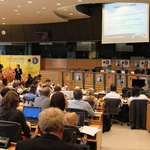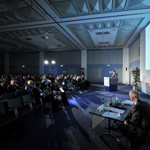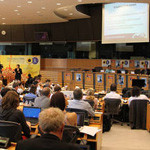New cell therapy shows progress in treating advanced liver disease
A new type of cell therapy to treat patients with liver scarring, or cirrhosis, shows promise of being the first medical treatment for this common and lethal condition.
Results from a clinical trial of the treatment will be presented at the American Association for the Study of Liver Diseases (AASLD) conference in Boston today (Monday November 13, 2023).
The innovative new approach to treating cirrhosis uses macrophage immune cells – the cells associated with tissue repair – derived from the patient’s own cells. It was tested in a clinical study, called ‘MATCH Phase 2’, involving 50 patients in Scotland with cirrhosis caused by a variety of different factors, such as alcohol, fatty-liver disease and viral hepatitis.
The data shows the treatment – pioneered by Professor Stuart Forbes’ lab at the University of Edinburgh – helped dramatically reduce serious liver-related complications during this one-year study. These complications can lead to hospitalisation and death.
The results indicate the treatment might help delay the need for a liver transplant, which is currently the only treatment option available to patients with advanced liver disease, but is a highly invasive procedure severely limited by organ availability, patient eligibility and complex aftercare.
Chronic liver diseases and associated cirrhosis account for approximately one million deaths per year globally, with 4,000 deaths per year in the UK alone.
In MATCH Phase 2, 26 patients received the macrophage treatment, and 24 patients in the control group received standard medical care only. After one year, there were no liver-related clinical events in any of the 26 patients treated with macrophages. In the control group, four patients out of the 24 developed liver-related severe adverse events, and there were three deaths.
Professor Stuart Forbes, a clinical hepatologist and Director of the University of Edinburgh’s Centre for Regenerative Medicine, has spent over a decade researching macrophages, supported by Edinburgh Innovations, the University’s commercialisation service. He and his team, funded by the Medical Research Council, have been investigating ways to understand and enhance the natural regenerative features of macrophage cells to create more effective medicines for liver disease.
An initial smaller study led by Professor Forbes in 2019, called MATCH Phase 1, showed the treatment was well tolerated, exhibiting none of the side effects commonly observed with immune cell therapy treatments. This was repeated in the MATCH Phase 2 results.




























